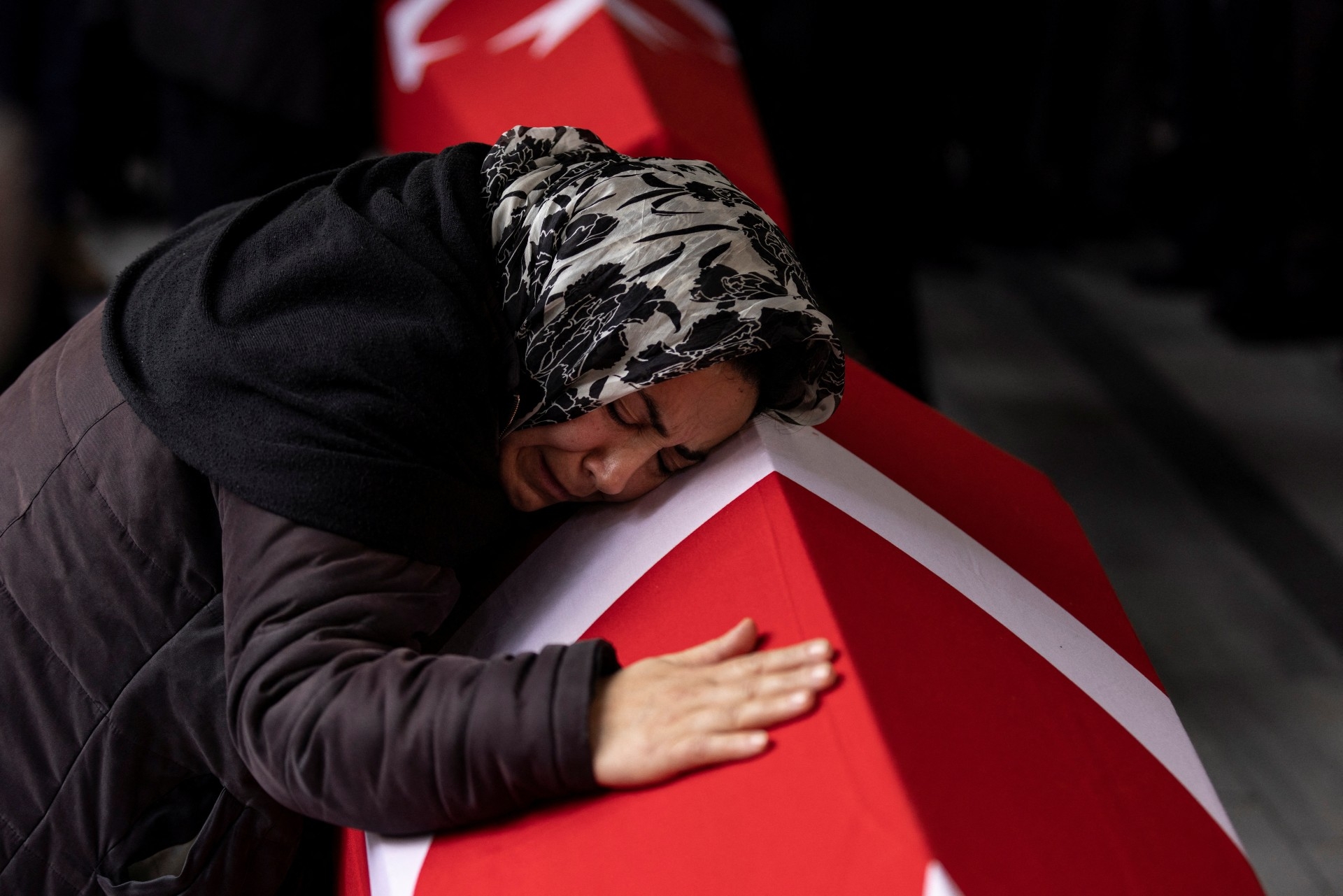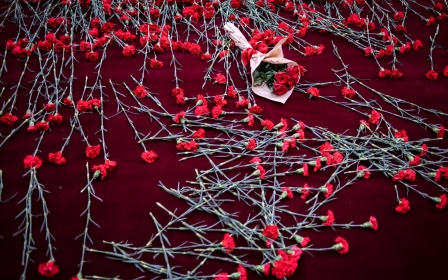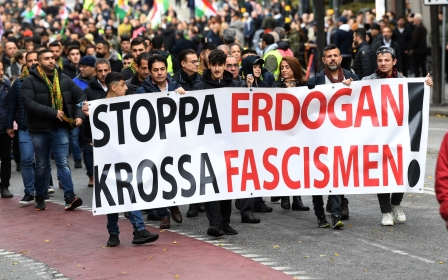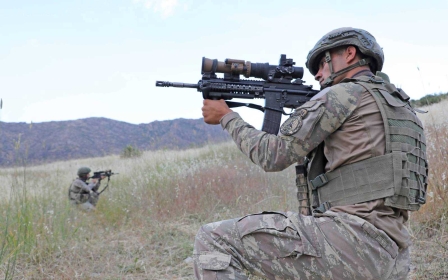Istanbul bombing revives old fears of terror in Turkey

As Istanbul shakes off the first apparent terror attack in six years, old fears have begun creeping back into the minds of the Turkish city’s residents.
Could this herald the start of another era of attacks, such as those seen in 2015 and 2016, when Kurdish groups and the Islamic State killed thousands, sowing horror and misery and placing a chokehold on Turkey’s economy and social welfare system?
Those years may have been the most violent period in recent Turkish history. Attacks by PKK-linked groups prompted a ferocious military campaign in southeast Turkey; the Islamic State group (IS) was a constant menace, and a failed coup attempt killed 251 people.
Muhlis Balik, a lawyer and Istanbul resident, told Middle East Eye that this latest attack, which killed six and wounded dozens on the pulsing Istiklal Avenue, was the last thing the country needs right now.
“People are angry, unhappy and increasingly becoming hopeless,” he said. Turkey is struggling with surging inflation, with the lira depreciating almost 300 percent against the dollar over the past year. Balik believes that the country may not be able to put up with further instability.
New MEE newsletter: Jerusalem Dispatch
Sign up to get the latest insights and analysis on Israel-Palestine, alongside Turkey Unpacked and other MEE newsletters
“Most of my clients are businesspeople who have been exporting multiple goods to Europe, thanks to the currency gap as well as to the failure of most European companies to absorb increasing transportation costs from China. Now, they are worried whether this attack is only the first one,” he said.
What we know so far about the Istanbul bombing
+ Show - HideTurkey's Interior Minister Suleyman Soylu has accused the Kurdistan Workers' Party (PKK) armed group of responsibility for a bombing in a busy Istanbul street that killed six people and wounded scores more.
Istanbul police said dozens of people had been arrested over Sunday's attack, including a woman suspected of having planted the bomb.
The PKK on Monday denied responsibilty for the attack and no group has so far claimed it.
In a statement on its website, the PKK said: "It is out of [the] question for us to target civilians in any way."
Here's what we know so far about the blast:
The suspect
Istanbul police say 46 people have been arrested over the attack, including a woman suspected of having planted the bomb.
The police said Ahlam Albashir is a Syrian national and that she had confessed to being trained by the PKK.
Footage released by the Istanbul police appeared to show that Albashir had a gun and some ammunition at her residence, along with a considerable amount of cash and some gold.
'Assassination' foiled
Soylu said on Monday morning in a live television interview from Istiklal Avenue, where the bombing hit, that if Albashir had not been arrested she could have escaped to Greece.
The minister also said that authorities had a phone tap showing that the PKK had ordered Albashir's killing after the attack and that authorities had arrested the person sent to kill her.
US criticised over attack
Condemnations of the attack and condolences for the victims have poured in from the United States, the European Union, Egypt, Ukraine, Greece and several other countries.
However, Turkish authorities linked the blast to Washington's support for the YPG, a Syrian Kurdish group that has been a US partner in the war against the Islamic State but is considered by Turkey to be the Syrian branch of the PKK.
The Turkish presidency's communications director, Fahrettin Altun, said such attacks "are direct and indirect results of the support some countries give to terrorist organisations".
Soylu likened the US condolences to "the murderer arriving as one of the first at the scene of the crime".
Syria and Iraq
Soylu said the order for the attack was given in Kobane, a city in northern Syria known as Ayn al-Arab in Arabic, where Turkish forces have carried out operations against the YPG in recent years.
Soylu said Albashir had passed through Afrin, a Turkish-held region of northern Syria, on her way to Istanbul.
The attack came as Ankara has intensified its drone attacks and operations against the PKK leadership in Syria and Iraq, killing several people, from mid-level officials to people in the leadership, in recent months.
There are also multiple Turkish military operations in northern Iraq, which have pushed the PKK towards the south.
The PKK, which previously fought for a breakaway state but now seeks greater autonomy for Kurds, has been fighting the Turkish authorities in a bloody conflict that began in the 1980s and has taken tens of thousands of lives.
Balik’s concerns are rooted in Turkey’s experience in the past wave of terror attacks.
In June 2015, two days before the general elections, an IS bomber carried out a suicide attack during the election campaign of the pro-Kurdish Peoples' Democratic Party (HDP) in Diyarbakir.
In the subsequent month, another IS suicide attacker killed 33 people, who had gathered in Sanliurfa to send humanitarian aid to IS-besieged Kobane.
The violent attacks expanded to bigger cities when two IS members blew themselves up in Ankara’s railroad terminal, killing 109, the deadliest attack in Turkish history.
After that, PKK-linked groups conducted several attacks against Turkish armed forces, killing not only officials but also civilians.
Istanbul became a target when an IS member killed 13 people in Sultanahmet Square, one of the most touristic sites of the city.
And the attacks kept going, hitting everywhere from Ankara to the Kurdish-dominated southeast, taking scores of lives.
'Our rooms were almost full but as soon as the explosion was heard, the guests queued in front of the desk to check out'
- Sergen Muratoglu, hostel manager
In the meantime, the Turkish economy was shrinking, GDP was decreasing, and the horror was becoming observable in society.
“We barely survived those days, as there were no tourists around. Then the pandemic came. We felt a little bit relieved in recent months thanks to the [increasing numbers of] tourists but now, this happened,” Sergen Muratoglu, a hostel manager, told MEE.
“Our rooms were almost full, but as soon as the explosion was heard, the guests queued in front of the desk to check out,” he said, adding that he was worried what would happen in the next few days.
Tourism has been one of the few positive sectors in the Turkish economy, with more than 40 million tourists visiting the country since January. Amounting to more than $17bn in the third quarter of this year, tourism became the main source of foreign currency flow as Turkey suffers from a shortage of liquidity.
The Turkish government has blamed the PKK for the latest attack, though the outlawed Kurdish separatist group denies responsibility. The PKK has been fighting the Turkish state in an effort to create a breakaway Kurdish state since the 1980s.
A recent study said PKK-linked groups were responsible for 2,473 attacks in Turkey in 2015 and 2016 alone, according to state records, compared to 25 in the first half of 2022.
Middle East Eye delivers independent and unrivalled coverage and analysis of the Middle East, North Africa and beyond. To learn more about republishing this content and the associated fees, please fill out this form. More about MEE can be found here.




